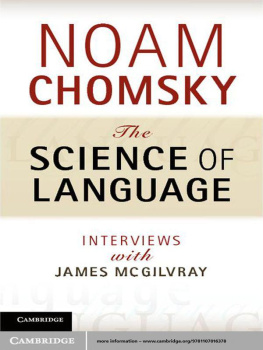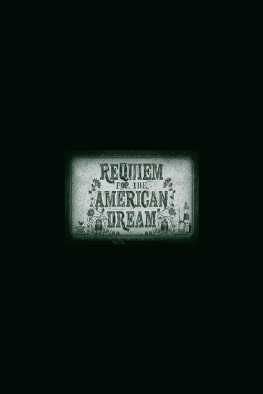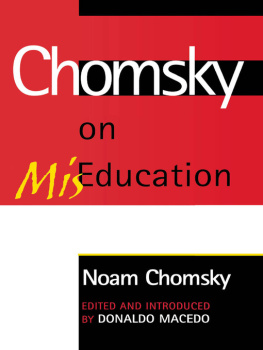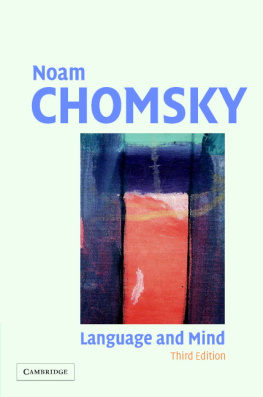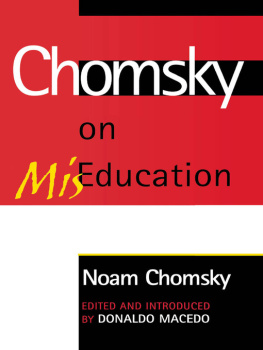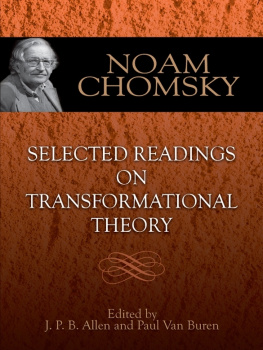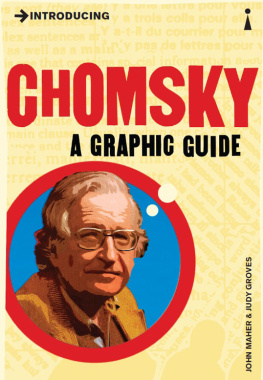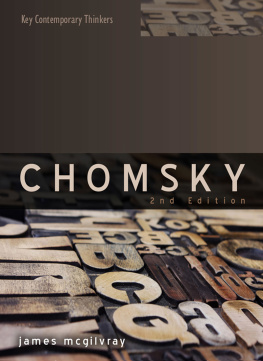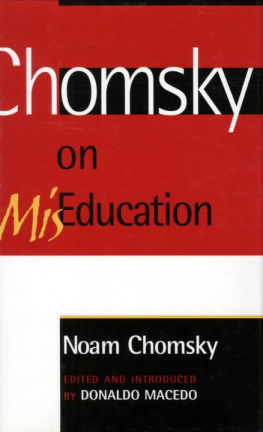The Science of Language
Noam Chomsky is one of the most influential thinkers of our time, yet his views are often misunderstood. In this previously unpublished series of interviews, Chomsky discusses his iconoclastic and important ideas concerning language, human nature, and politics. In dialogue with James McGilvray, Professor of Philosophy at McGill University, Chomsky takes up a wide variety of topics the nature of language, the philosophies of language and mind, morality and universality, science and common sense, and the evolution of language. McGilvray's extensive commentary helps make this incisive set of interviews accessible to a variety of readers. The volume is essential reading for those involved in the study of language and mind, as well as anyone with an interest in Chomsky's ideas.
NOAM CHOMSKY is Institute Professor (retired) in the Department of Linguistics and Philosophy at the Massachusetts Institute of Technology.
JAMES MCGILVRAY is Professor of Philosophy at McGill University, Montral.
The Science of Language
Interviews with James McGilvray
Edited by
Noam Chomsky and James Mcgilvray
CAMBRIDGE UNIVERSITY PRESS
Cambridge, New York, Melbourne, Madrid, Cape Town, Singapore, So Paulo, Delhi, Mexico City
Cambridge University Press
The Edinburgh Building, Cambridge CB2 8RU, UK
Published in the United States of America by Cambridge University Press, New York
www.cambridge.org
Information on this title: www.cambridge.org/9781107602403
Noam Chomsky and James McGilvray 2012
This publication is in copyright. Subject to statutory exception and to the provisions of relevant collective licensing agreements, no reproduction of any part may take place without the written permission of Cambridge University Press.
First published 2012
Printed in the United Kingdom at the University Press, Cambridge
A catalogue record for this publication is available from the British Library
Library of Congress Cataloging-in-Publication Data
Chomsky, Noam.
The science of language : interviews with James McGilvray / Noam Chomsky.
p. cm.
ISBN 978-1-107-01637-8 (Hardback) ISBN 978-1-107-60240-3 (Paperback)
1. Chomsky, NoamInterviews. 2. Chomsky, NoamPhilosophy. 3. Cognition
and language. 4. Psycholinguistics. I. McGilvray, James. II. Title.
P85.C47A3 2011
401dc23
2011030292
ISBN 978-1-107-01637-8 Hardback
ISBN 978-1-107-60240-3 Paperback
Cambridge University Press has no responsibility for the persistence or accuracy of URLs for external or third-party internet websites referred to in this publication, and does not guarantee that any content on such websites is, or will remain, accurate or appropriate.
Contents
Introduction
While this book will be of interest to the specialist, it is intended for a general audience. The title, The Science of Language , might appear daunting, but Professor Chomsky's contributions to the interview can be understood by all and where readers might want some additional information or aid in understanding why Chomsky adopts the unusual views that he does I provide ample explanations. However, some might still ask why they should be interested in the science of language at all, and in Chomsky's views of it in particular.
A recent (January 2010) PBS series called The Human Spark starring Alan Alda explored the question of what makes modern humans distinctive. After all, there have been humanoid creatures around for hundreds of thousands of years, but it was only relatively recently in evolutionary time on a reasonable guess, somewhere between fifty thousand and a hundred thousand years ago that humans began to display the remarkable cognitive powers that so clearly distinguish us from chimps and other higher apes. We form non-kin communities that do not involve direct contact or acquaintance with others; we have science and mathematics and seek ultimate explanations, sometimes in the form of religions; we think about things both temporally and spatially distant, and produce and enjoy fiction and fantasy; we organize and plan for the future in ways that go beyond anything other creatures can manage; we speculate; we draw and employ other forms of artistic media; we produce and enjoy music; we see connections between distant events and seek explanations that will prove reliable and yield good policies; and so on. The conclusion the PBS series reached was that the introduction of language must surely be among the most important factors explaining how these remarkable capacities came to us.
That conclusion makes sense on independent grounds. You cannot speculate and think about matters far and near unless you have some way of constructing an unlimited number of complex thoughts that you can detach from current circumstances and use to range over arbitrary times and circumstances. Language gives you this capacity. You cannot organize and construct projects involving cooperation between individuals unless you have a way of planning well into the future, providing for contingencies, and assigning specific roles; language gives you that. You cannot do science without seeking basic explanations and using mathematics and ways of quantifying exactly; there is good reason to think that language gives you at least the capacity to count things and measures. And so on. Music might be independent of language; it is not clear. However, it is obvious that neither music nor other forms of art can provide all the cognitive benefits that language can, and make these benefits available to all humans who develop language at all. Language is the default way of saying what a work of art expresses. It is the primary expressive and creative medium.
So one reason to be interested in the science of language is because it tells us what natural languages are, what gives us, but no other creatures, language, and what explains the introduction of language and the beginnings of our remarkable cognitive capacities.
It is particularly important to understand Chomsky's views on these matters, not only because he virtually created the modern science of language by himself and ever since has influenced the work of many of the individuals who have increasingly improved this science, but because of what he and colleagues have discovered about language particularly in recent years and the implications of these discoveries for topics of broad interest, topics that Chomsky takes up in his famous political work and his less known but important philosophical works. For Chomsky, the science of language is an objective natural science that treats language as a biologically based system that evolved in a single individual and was genetically transmitted to progeny. Evolution of the sort he describes very different from the usual gradualist stories about evolution of complex systems nicely explains how language came about. And there are important implications of the fact that language is a natural object, and that it came about by means of the kind of evolution Chomsky describes.
One implication of the idea that the evolutionary introduction of language may have made us the distinctive species we are is that it perhaps by itself explains what is human about human nature. If this is so, there is a naturalistic not religious, and not merely speculative account of our distinctiveness and its origins. If so, and assuming that a creature's fundamental needs are based on its nature, we might be able to find a naturalistic basis for views about the good life for this kind of creature. That topic is taken up to an extent in the discussion, but only tentatively however tantalizing the prospect of a scientific basis for the good life it might be: Chomsky the scientist wants (as any scientist should) a good theory of human nature in place before he is willing to be firm in his commitments. That theory is not yet in place. However, the issue of what the good life is for human beings is important enough to need discussion, at least, and tentative answers.

